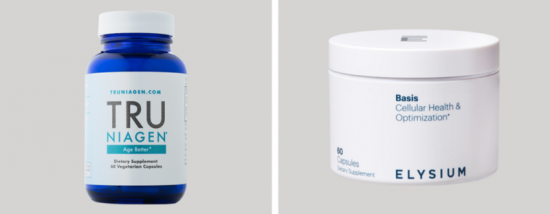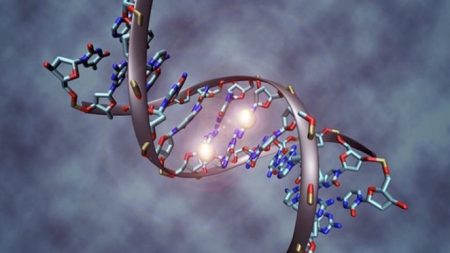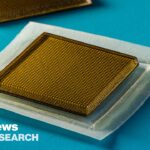December 15, 2017 – A molecule named NAD, short for Nicotinamide Adenine Dinucleotide, is a coenzyme within the cell that plays a critical role in repairing DNA. Earlier this year researchers at Harvard Medical School, described the role NAD plays as a regulator of proteins involved in DNA repair. In experiments on mice, NAD was shown to mitigate age-related DNA damage. Harvard’s David Sinclair, a professor in the Department of Genetics, described the findings as unveiling “a key mechanism in cellular degeneration and aging.” He went to note that NAD could become a “therapeutic avenue to halt and reverse age-related…DNA damage.”
The presence of NAD in cells declines as we age and researchers suspect that the slow deterioration in DNA with unrepaired breaks accumulating over time leads to cell death. When NAD levels are increased, however, aging processes in all life forms from bacteria to us are altered. Hence there is a concerted effort being made by drug companies and researchers to create a NAD supplement to increase the supply of NAD in our bodies with the implications that this could be the elixir of immortality.
States a NAD expert, Eric Verdin, President of the Buck Institute for Research on Aging, located in Novato, California, “The loss of NAD that occurs during aging, I predict will end up being a major pathway in our fight to delay aging and the diseases associated with it.” But delivering it in a supplement, which some companies are professing to do, may not produce the desired anti-aging effect. Verdin argues that NAD is becoming “a story about money more than about science and medicine.”
Jane Metcalfe has created an online magazine called Neo.life that focuses on the potential to transform our species in the 21st century from a lifespan with a so-called natural limit of a little more than a century, to one that can be extended indefinitely. She describes how customers are shelling out up to $60 U.S. per month for a bottle of a product called Basis, developed by an MIT professor and backed by a board of seven Nobel laureate advisors. The company is called Elysium Health and Basis, its product contains an ingredient called nicotinamide riboside (NR). And what NR could conceivably do according to some research, is naturally boost NAD levels in our bodies.
Elysium Health isn’t the only purveyor of NR. Another company Chromadex, working with Dartmouth, Cornell and Washington Universities, has been producing an NR supplement called Niagen at $45 per bottle. The two companies, Elysium and Chromadex, are in a court fight as we speak to determine which will win the NAD wars.

And then there is Resveratrol, found in wine, containing sirtuins, enzymes that are influenced by the presence of NAD to stimulate the mitochondria, the engine in our cells. Sirtuins, which come in a number of forms keep mitochondria running smoothly. When NAD levels drop, sirtuin activity drops as well, and mitochondria become negatively impacted.
Resveratrol can be found in nature in blueberries and grapes (hence in wine). Nutritionists talk about anti-oxidants found in blueberries and how they contribute to body health, but now we have another reason to eat them because they can potentially impact NAD levels, and theoretically, therefore our lifespans. At least we know that’s the case in mice, when given NR supplements to increase NAD, turn out to be much healthier than a control group of brethren when both are fed high-fat diets. In a Scientific American article published in 2012, it cites research done by Harvard’s Sinclair who noted that mice on NR gained 60% less weight on the same diet as mice not on NR. Sinclair concluded that the impact on metabolism was “nothing short of astonishing.”

Jeffrey Flier, whose research focus is cellular metabolism, and who was a former Dean of the Harvard Medical School, sees no scientific evidence that NR supplements do what Chromadex or Elysium claim of extending human lifespan. All we do know is that NR supplements raise NAD levels in the blood of mice and people. Does that translate into extending our lifespan? There is certainly no evidence to support that. There is, however, evidence that in mice increased NAD levels can impact aging and aging-related diseases.
If the leap can be made from mice to humans then could NR help combat Alzheimer’s? The role mitochondria play in the onset of Alzheimer’s remains poorly understood but NR-fed mice with Alzheimer’s-like symptoms have shown significant improvements when on the supplement. States Verdin related to his research on NAD, “The loss of NAD that occurs during aging, I predict will end up being a major pathway in our fight to delay aging and the diseases associated with it. The data is really there.”
On the issue of aging and human immortality, I asked the question in a blog posting some time ago “will someone born in the 21st century be the first millenarian?” Not familiar with this term. It means 1,000 and refers to a human lifespan ten centuries in length. Seems inconceivable today but with CRISPR technology and the ability to re-engineer DNA down to pairs of nucleobases, I wonder why can just bypass the supplements and get on with the job of regenerating ourselves indefinitely.
















